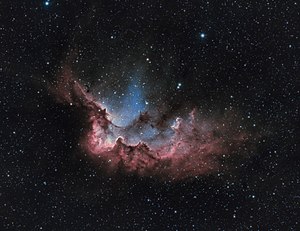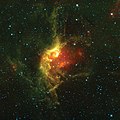NGC 7380
| NGC 7380 | |
|---|---|
 NGC 7380 in classic Hubble Palette (Ha/OIII/SII) by amateur astronomer Chuck Ayoub | |
| Observation data (J2000.0 epoch) | |
| Right ascension | 22h 47m 21.0s[1] |
| Declination | +58° 07′ 54″[1] |
| Distance | 8.5 ± 1.3 kly (2.6 ± 0.4 kpc)[2] |
| Apparent magnitude (V) | 7.2 |
| Apparent dimensions (V) | 25′ |
| Physical characteristics | |
| Radius | ~20 ly (6 pc) |
| Estimated age | 4[2] to 11.9 Myr[1] |
| Other designations | NGC 7380,[3] Sh2-142, Cr 452 |
| Associations | |
| Constellation | Cepheus |
NGC 7380 is a young[4] open cluster of stars in the northern circumpolar constellation of Cepheus, discovered by Caroline Herschel in 1787. The surrounding emission nebulosity is known colloquially as the Wizard Nebula, which spans an angle of 25′. German-born astronomer William Herschel included his sister's discovery in his catalog, and labelled it H VIII.77. The nebula is known as S 142 in the 1959 Sharpless catalog (Sh2-142).[2] It is extremely difficult to observe visually, usually requiring very dark skies and an O-III filter. The NGC 7380 complex is located at a distance of approximately 8.5 kilolight-years from the Sun, in the Perseus Arm of the Milky Way.[2]
The cluster spans ~20 light-years (6 pc) with an elongated shape and an extended tail.[2] Age estimates range from 4[2] to 11.9[1] million years. At the center of the cluster lies DH Cephei, a close, double-lined spectroscopic binary system consisting of two massive O-type stars. This pair are the primary ionizing source for the surrounding H II region, and are driving out the surrounding gas and dust while triggering star formation in the neighboring region.[4] Of the variable stars that have been identified in the cluster, 14 have been identified as pre-main sequence stars while 17 are main sequence stars that are primarily B-type variables.[4]
Gallery
[edit]-
NGC 7380 in Hubble Palette (Ha/OIII/SII)
-
NGC 7380 from WISE.
-
NGC 7380 from the Mount Lemmon SkyCenter using the 0.8m Schulman Telescope.Broadband (RGB) image.
-
NGC7380 Nebula from South Common Observatory
References
[edit]- ^ a b c d Wu, Zhen-Yu; et al. (November 2009), "The orbits of open clusters in the Galaxy", Monthly Notices of the Royal Astronomical Society, 399 (4): 2146–2164, arXiv:0909.3737, Bibcode:2009MNRAS.399.2146W, doi:10.1111/j.1365-2966.2009.15416.x, S2CID 6066790.
- ^ a b c d e f Chen, W. P.; et al. (September 2011), "A Kinematic and Photometric Study of the Galactic Young Star Cluster NGC 7380", The Astronomical Journal, 142 (3): 15, Bibcode:2011AJ....142...71C, doi:10.1088/0004-6256/142/3/71, S2CID 120469041, 71.
- ^ "NGC 7380". SIMBAD. Centre de données astronomiques de Strasbourg. Retrieved 2020-10-18.
{{cite web}}: CS1 maint: postscript (link) - ^ a b c Lata, Sneh; et al. (March 2016), "Variable stars in young open star cluster NGC 7380", Monthly Notices of the Royal Astronomical Society, 456 (3): 2505–2517, arXiv:1511.08892, Bibcode:2016MNRAS.456.2505L, doi:10.1093/mnras/stv2800, S2CID 118473907.
External links
[edit]- NGC 7380 on WikiSky: DSS2, SDSS, GALEX, IRAS, Hydrogen α, X-Ray, Astrophoto, Sky Map, Articles and images
- South Common Observatory - Images of the Wizard Nebula
- NASA APOD mentioning the Wizard Nebula
- SEDS – NGC 7380





